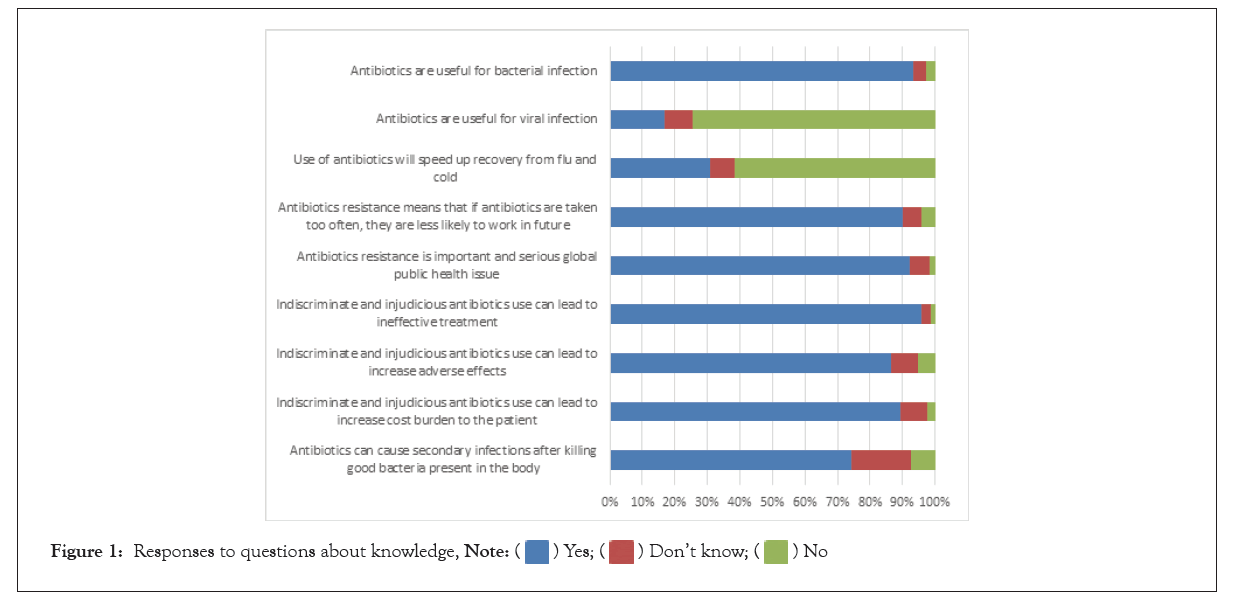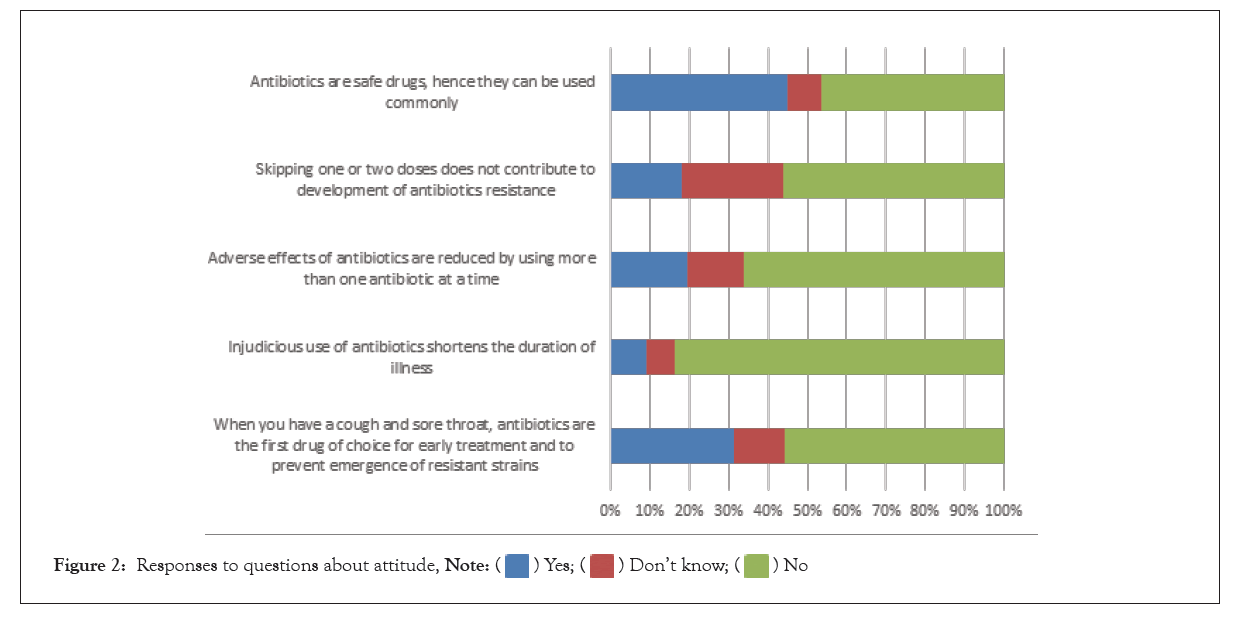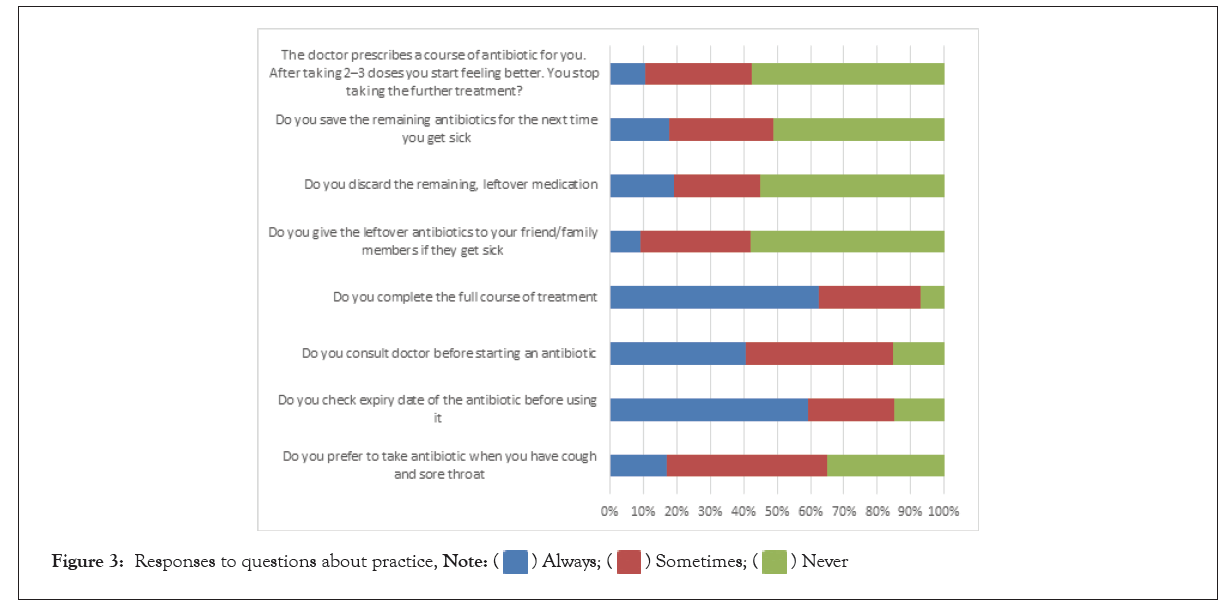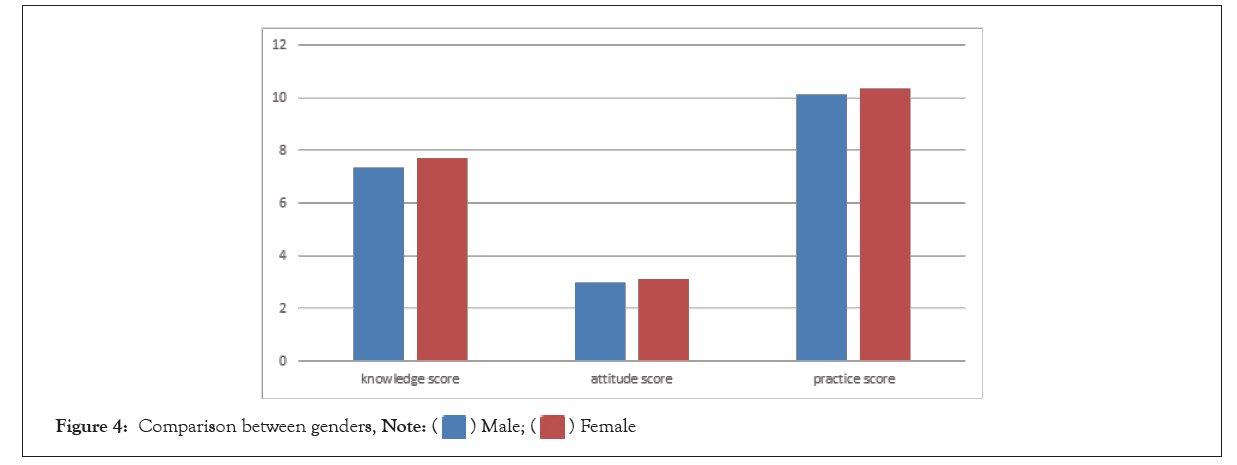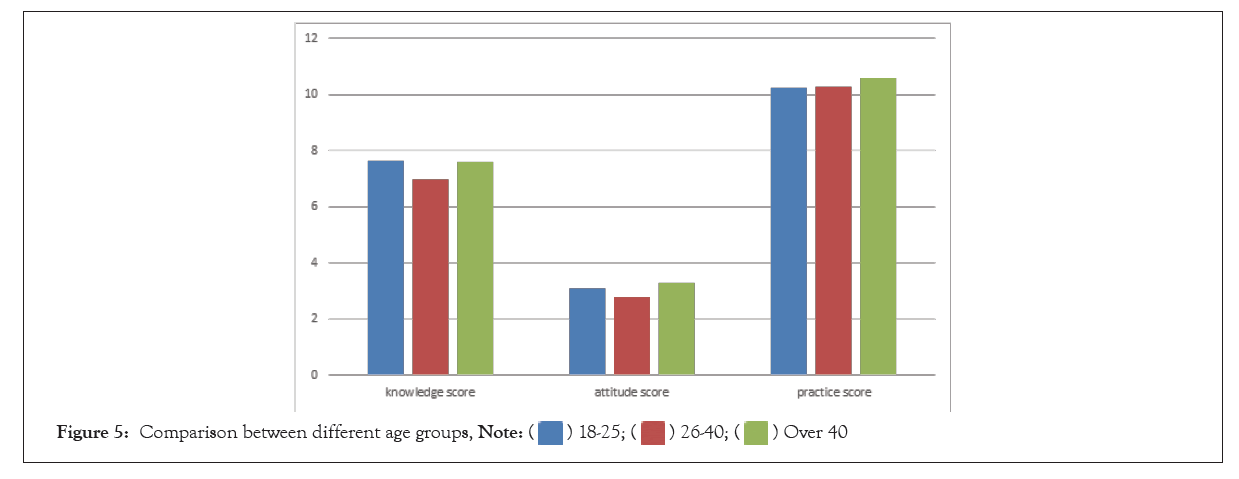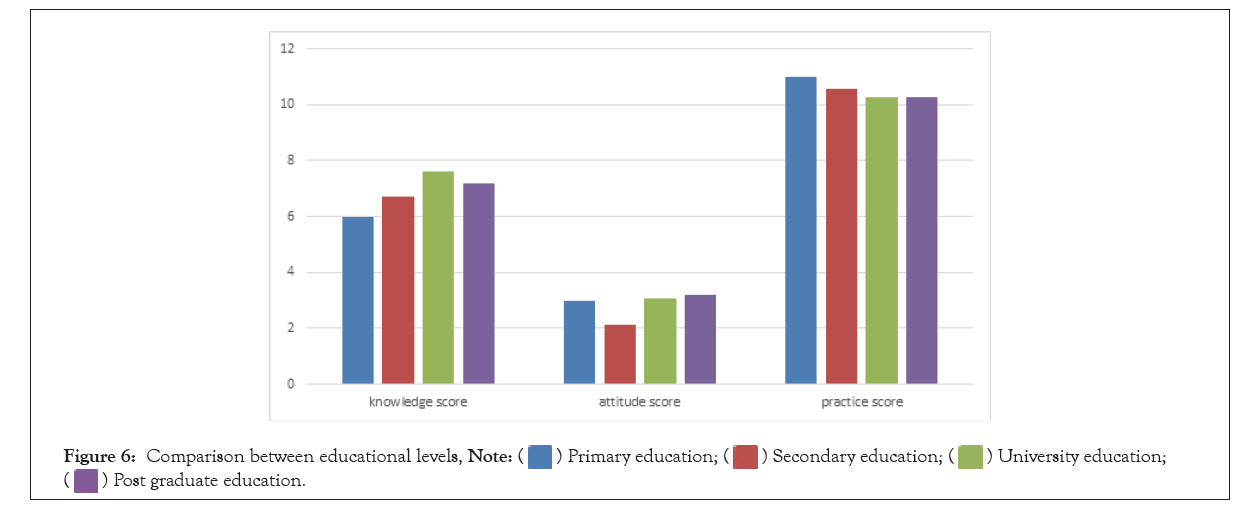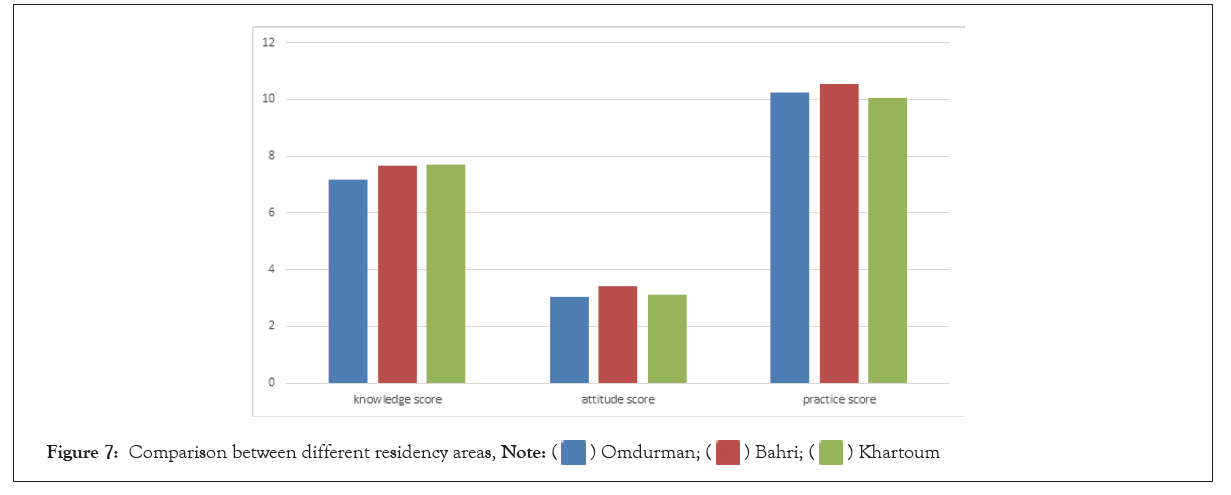Research - (2022)
Knowledge, Attitude and Practice Regarding Antibiotic use and Resistance among Khartoum State Residents 2021
Abubakr Almardi Mohammed Khojali*Abstract
Introduction: Antibiotic resistance is one of the of the world must lethal health crisis affecting low-and middle- income countries, the economic burden of the issue is high. Multi-drug resistant strains are emerging, and actions are needed to counter it.
Objective: To study knowledge, attitude and practice regarding antibiotic use and resistance among Khartoum state residents.
Methodology: Community based cross-sectional study was conducted in Khartoum state, Sudan, residents were involved in the study were randomly selected, and the questionnaire was delivered and data about Khartoum residents’ knowledge, attitude and practice regarding antibiotic use and resistance were collected.
Results: A total of 351 samples were collected, the sample included more females (58.7% vs 41.3), most of the respondents were in the 18-25 age groups, majority were students, most of the respondents had achieved university and post graduate education, and most of the respondents were from Khartoum, Omdurman and then Bahri. The mean monthly income was 141759 SDGs. Majority had good knowledge regarding antibiotic use and resistance, more than 15% of respondents didn’t know that antibiotic use can result in secondary infections after killing the good bacteria. Majority of respondents had positive attitude regarding antibiotic use and resistance, except in question 15 majority of patients think antibiotics are not safe drugs. Majority of respondents had good practice regarding antibiotic use, except in question 20 where the majority doesn’t consult in a regular basis every time before starting antibiotic.
Conclusion: The study concluded that the majority of Khartoum state residents had good knowledge regarding antibiotic use and resistance and good attitude and practice regarding antibiotic use. This research is an important step in the understanding of knowledge, attitude and practice regarding antibiotic use and resistance among residents of Khartoum, its results can be used in formulation of future educational programs.
Keywords
Antibiotic resistance; Antibiotic use; Staphylococcus aureus
Introduction
Antibiotics are a group of chemical compounds that either kill bacteria or inhibit their growth, they are used frequently in medicine to cure infections. They are the most frequent prescribed drugs; they are often used for treatment of illnesses that mostly caused by viral infections [1]. Antibiotic resistance is the emergence of new strains of bacteria that resist the action of antibiotics, such as methicillin resistant Staphylococcus aureus and multi drug resistant actinomycete; it is considered a global health problem affecting mostly low and middle income countries [2].
Antibiotic resistance is absolutely one of the major lethal health crises not only in Sudan but all over the world. The WHO estimated that by the year 2050, 10 million people will die due to infection with antibiotic resistant bacteria all over the globe, and by 2030, antimicrobial resistance could force up to 24 million people into extreme poverty [3]. The economic burden of the issue is high, according to a September 2013 report from the U.S. Centers for Disease Control and Prevention (CDC), treatment of antibiotic- resistant infections adds $35 billion to health care costs and 8 million hospital days per year in the United States [4].
Widespread inappropriate use of antibiotics is a major contributing factor to the emergence of antibiotic resistant bacterial strains [5]. Health professionals’ lack of knowledge about the antibiotic course, dose and side effects can lead to inappropriate use [6], so can limited community knowledge (including self-medication) and availability of health care services [7]. It is estimated that approximately two thirds of oral antibiotics used worldwide are obtained without prescription and are inappropriately used [8-10].
Antibiotic resistance is one of the biggest public health challenges of our time. Infection with drug resistant bacteria is harder to treat than those of non-resistant bacteria. Antibiotic resistance leads to higher medical costs, prolonged hospital stays, and increased mortality [11]. Each year in the U.S., at least 2.8 million people get an antibiotic-resistant infection, and more than 35,000 people die. Antibiotic resistance is an important health problem that leads to death from untreated infections [12,13].
Since irrational use of antibiotics participated largely in the emergence of new multidrug resistant bacteria this research was conducted to provide baseline data to help in increasing awareness. Community member’s needs knowledge to improve health practices related to antibiotic use, this research was conducted to provide information necessary to create educational programs [14].
Materials and Methods
Study design
Descriptive study, community based cross-sectional study design.
Study site
The study was conducted at Khartoum state, one of the eighteen states of Sudan, located at middle of Sudan, comprises 3 cities Omdurman, Bahri and Khartoum city which is the capital of Sudan.
Sample size and sampling technique
The sample size was calculated to be 384 using the formula of unknown population. 351 responses were collected using convenient sampling through online platforms “Facebook, Twitter and Telegram”. Khartoum residents of Sudanese nationality and above 18 were included in the study; non-Sudanese residents below 18 years were excluded from the study.
Data collection instrument
Structural open ended and close ended questionnaire. The questionnaire was delivered using google form via social media (online survey) and the collected data was analysed using google form and SPSS version 22.
Data analysis
Knowledge and attitude were analysed using 5-point likert scale whose responses are strongly agree, agree, neither agree nor disagree, disagree and strongly disagree. Strongly agree and agree were regarded as agree, and strongly disagree and disagree were regarded as disagree. A scoring system was used, with 1 point for the correct answer and 0 for the other answers. The total is 9 points for knowledge and 5 point for attitude. Practice was analysed using 3-point scale whose responses are always, sometimes and never.
For the right practice 2 point for always, 1 point for sometimes and 0 for never. For the wrong practice 2 points for never, 1 point for sometimes and 0 for always. The total is 16 points.
The collected data was coded and entered in SPSS version 22. Frequency, means and percentages was calculated to find out knowledge, attitude and practice toward antibiotic use and their resistance.
Results
Characteristics of respondents
A total of 351 samples were collected, the sample included more females (58.7% vs. 41.3), most of the respondents were in the 18-25 age groups, majority were students, most of the respondents had achieved university and post graduate education, and most of the respondents were from Khartoum, Omdurman and then Bahri. The mean monthly income was 141759 SDGs (Table 1).
| Variable | Number | Percentage |
|---|---|---|
| Gender | ||
| Male | 145 | 41.30% |
| female | 206 | 58.70% |
| Age group | ||
| 18-25 | 299 | 85.20% |
| 26-40 | 42 | 12% |
| Over 40 | 10 | 2.80% |
| Residency | ||
| Omdurman | 108 | 40.40% |
| Bahri | 47 | 17.60% |
| Khartoum | 112 | 41% |
| Level of education | ||
| Primary school | 1 | 0.30% |
| Secondary school | 7 | 2% |
| University | 323 | 92% |
| Post graduate education | 20 | 5.70% |
Table 1: Socio-demographic characteristics of respondents.
Knowledge, attitude and practice regarding antibiotic use and resistance
Majority had good knowledge regarding antibiotic use and resistance; more than 15% of respondents didn’t know that antibiotic use can result in secondary infections after killing the good bacteria (Figure 1).
Figure 1: Responses to questions about knowledge,
The level of knowledge about antibiotic use and resistance was better for responders who were females (x2=14.4, p value=0.026), 18-25 years (x2=25.691, p value=0.042), university education (x2=26.858, p value=0.217) and living in Khartoum (x2=20.799, p value=0.049).
Majority of respondents had positive attitude regarding antibiotic use and resistance, except in question 15 majority of patients think antibiotics are not safe drugs, more than 25% of respondents didn’t know that skipping one or two doses can participate in development of antibiotic resistance (Figures 2 and 3).
Figure 2: Responses to questions about attitude,
Figure 3: Responses to questions about practice,
The level of attitude regarding antibiotic use and resistance was better for respondents who were females (x2=6.243, p value=0.328), over 40 (x2=10.326, p value=0.248), post graduates (x2=13.154, p value=0.165), and people living in Bahri (x2=20.097, p value=0.120).
Majority of respondents had good practice regarding antibiotic use, except in question 20 where the majority (Figures 4 and 5).
Figure 4: Comparison between genders, 
Figure 5: Comparison between different age groups, 
Doesn’t consult in a regular basis every time before starting antibiotic. Majority of respondents sometimes take antibiotic when they have sore throat or cough (Figures 6 and 7).
Figure 6: Comparison between educational levels, 

Figure 7: Comparison between different residency areas, 
Practice regarding antibiotic use was better in females (x2=17.805, p value=0.410), over 40 (x2=45.476, p value=0.918), post graduate (x2=50.054, p value=0.982) and people living in Bahri (x2=35.625, p value=0.558).
Discussion
There is no published study regarding knowledge, attitude and practice regarding antibiotic use and resistance in Sudan. Overall, the respondents had good knowledge regarding antibiotic use, majority of respondents responds correctly in the question antibiotics are useful for bacterial infection (93%) which is comparable to a similar study that was done in Nepal [15-17]and significantly larger than 56% in a study done in Kuwait [18], 75% of respondents know that antibiotics can lead to secondary infections by killing good bacteria which is comparable to 70% and 68% in studies done in Saudi Arabia and Kuwait respectively [14,19].
About 61.5% of respondents respond no to the question antibiotic can speed up recovery from flu which is significantly higher than 47.3% correct response in the Kuwait research [18] and significantly lower from a similar study (more than 85%) [12], 74.4% thinks antibiotics can kill good bacteria which is comparable to the results of the study conducted in Nepal [17]. 90% of respondents think that antibiotic resistance is a global health problem which is significantly higher than 9.9% of Kuwait study [16].
Regarding attitude 18.3% responded yes in the question skipping one or two doses may can contribute to the development of resistance which is significantly lower when compared to the results of the same study mentioned above (40%), 45% thinks that antibiotics are safe drugs which is significantly higher when compared to the results of the same study (<15%) [17].
Regarding practice 64% prefer to take antibiotics when they have sore throat or cough which is slightly lower compared to the same study (70%), 84% checks expiratory date before taking the antibiotic which is comparable to the results of the same study of Nepal.
Conclusion
The study concluded that the majority of Khartoum state residents have good knowledge regarding antibiotic use and resistance and generally good attitude and practice regarding antibiotic use. This research is an important step in the understanding of knowledge, attitude and practice regarding antibiotic use and resistance among residents of Khartoum, its results can be used in formulation of future educational programs and can be used to correct miss concepts and false believes about antibiotic use and resistance and to correct misbehaviours that can result in antibiotic resistance.
Recommendation
Ongoing research studies should focus on finding the reasons behind misbehaviours and research about sensitivity patterns should be done in Sudan to formulate guidelines that help doctors to choose antibiotics for prescription in a way that minimizing the emergence of new strains of resistance bacteria.
Declaration
I hereby declare that this thesis is the result of my own investigations, except where otherwise stated.
Ethical Considerations
• Ethical approval was obtained from Al- Neelain university faculty of medicine.
• Informed consent was taken from participants and was assured of their confidentiality.
Conflict of Interest
No conflict of interest.
References
- Earnshaw S, Monnet DL, Duncan B, O’Toole J, Ekdahl K, Goosens H. The first Europe-wide public information campaign on prudent antibiotic use: methods and survey of activities in participating countries. Euro Surveill. 2009.
[Cross Ref] [Google Scholar] [PubMed]
- Sabry NA, Farid SF, Dawoud DM. Antibiotic dispensing in Egyptian community pharmacies: An observational study. Res Social Adm Pharm. 2014;10(1):168-184.
[Cross Ref] [Google Scholar] [PubMed]
- New report calls for urgent action to avert antimicrobial resistance crisis. 2021
- Dantas G, Sommer MO. How to fight back against antibiotic resistance. Sci Am. 2014;102(1):42-51.
- Radyowijati A, Haak H. Improving antibiotic use in low-income countries: An overview of evidence on determinants. Soc Sci Med. 2003;57(4):733-744. 1.
[Cross Ref] [Google Scholar] [PubMed]
- Michael CA, Dominey-Howes D, Labbate M. The antimicrobial resistance crisis: Causes, consequences, and management. Front Public Health. 2014;2:145.
[Cross Ref] [Google Scholar] [PubMed]
- Simba D, Kakoko D, Semali I, Kessy A, Embrey M. Household knowledge of antimicrobials and antimicrobial resistance in the wake of an Accredited Drug Dispensing Outlet (ADDO) program rollout in Tanzania. PloS one. 2016;11(9).
[Cross Ref] [Google Scholar] [PubMed]
- Council US. National intelligence estimate: The global infectious disease threat and its implications for the United States. Environ Change Secur Proj Rep. 2000(6):33-65.
[Google Scholar] [PubMed]
- Warren L. Review of medical microbiology and immunology. 2016.
- Brian J. Werth. Overview of Antibiotics. 2021.
- Antibiotic. 2021.
- About Antibiotic Resistance. 2021.
- Munita JM, Arias CA. Mechanisms of antibiotic resistance. Microbiol Spectr. 2016;4(2):4-2.
[Cross Ref] [Google Scholar] [PubMed]
- Lorenz MG, Wackernagel W. Bacterial gene transfer by natural genetic transformation in the environment. Microbiol Rev. 1994;58(3):563-602.
[Cross Ref] [Google Scholar] [PubMed]
- Bello-López JM, Cabrero-Martínez OA, Ibáñez-Cervantes G, Hernández-Cortez C, Pelcastre-Rodríguez LI, Gonzalez-Avila LU, et al. Horizontal gene transfer and its association with antibiotic resistance in the genus Aeromonas spp. Microorganisms. 2019;7(9):363.
[Cross Ref] [Google Scholar] [PubMed]
- Shintani M. The behavior of Mobile Genetic Elements (MGEs) in different environments. Biosci Biotechnol Biochem. 2017;81(5):854-862.
[Cross Ref] [Google Scholar] [PubMed]
- Nepal A, Hendrie D, Robinson S, Selvey LA. Knowledge, attitudes and practices relating to antibiotic use among community members of the Rupandehi District in Nepal. BMC Public Health. 2019;19(1):1-2.
[Cross Ref] [Google Scholar] [PubMed]
- Awad AI, Aboud EA. Knowledge, attitude and practice towards antibiotic use among the public in Kuwait. PloS one. 2015;10(2).
[Cross Ref] [Google Scholar] [PubMed]
- Alnasser AH, Al-Tawfiq JA, Ahmed HA, Alqithami SM, Alhaddad ZM, Rabiah AS, et al. Public knowledge, attitude and practice towards antibiotics use and antimicrobial resistance in Saudi Arabia: A web-based cross-sectional survey. J Public Health Res. 2021;10(4).
[Cross Ref] [Google Scholar] [PubMed]
Author Info
Abubakr Almardi Mohammed Khojali*Citation: Khojali AAM (2022) Knowledge, Attitude and Practice Regarding Antibiotic use and Resistance among Khartoum State Residents 2021. Appli Microbiol Open Access. S1: 002.
Received: 10-Aug-2022, Manuscript No. AMOA-22-18781; Editor assigned: 13-Aug-2022, Pre QC No. AMOA-22-18781; Reviewed: 01-Sep-2022, QC No. AMOA-22-18781; Revised: 09-Sep-2022, Manuscript No. AMOA-22-18781; Published: 20-Sep-2022 , DOI: 10.35284/2471- 9315.22.S1.003
Copyright: © 2022 Khojali AAM. This is an open-access article distributed under the terms of the Creative Commons Attribution License, which permits unrestricted use, distribution, and reproduction in any medium, provided the original author and source are credited.
